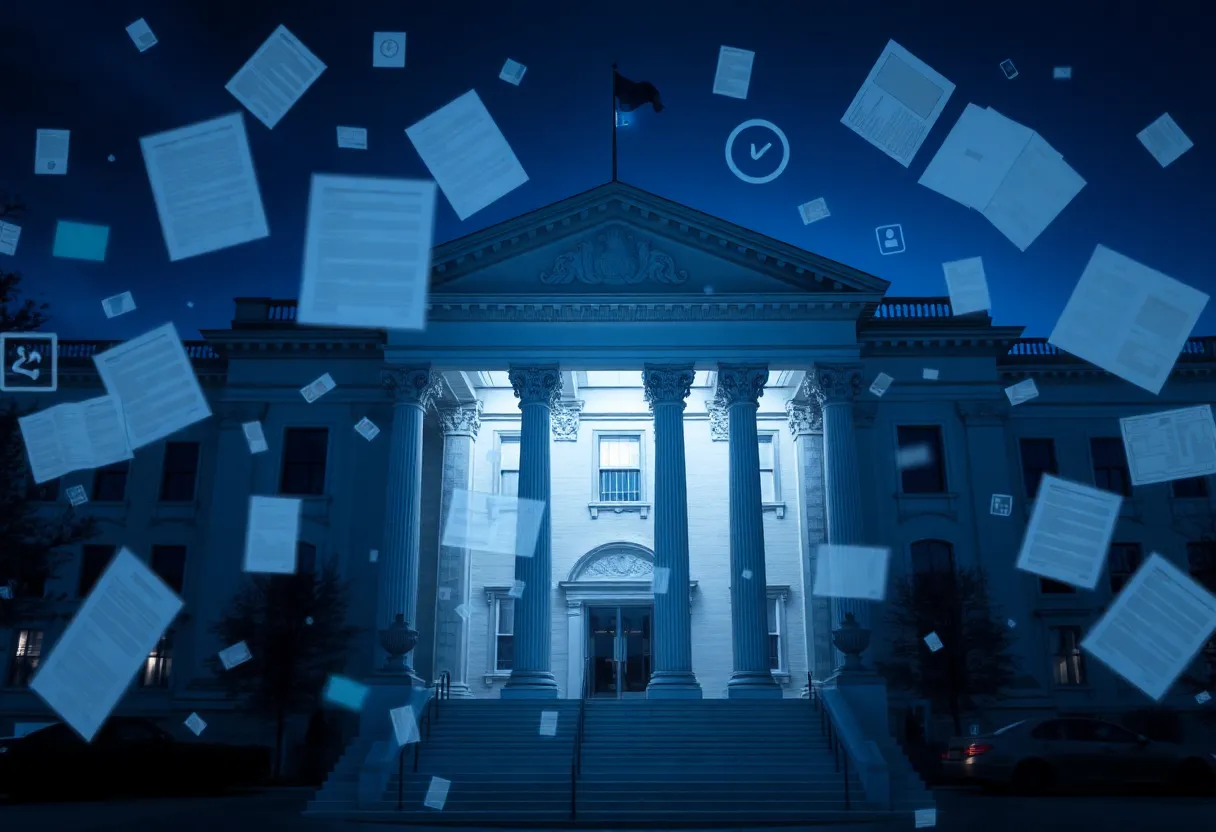News Summary
Governor Daniel J. McKee’s administration has opposed a proposed overhaul of the Rhode Island Access to Public Records Act, which includes 48 amendments aimed at modernizing the law. Concerns include potential invasions of privacy, disruptions to criminal investigations, and financial burdens for public entities. The proposal also brings up issues regarding the disclosure of subpoenas and traffic accident data. Supporters of the legislation argue it would enhance government transparency, while the McKee administration warns against potential negative impacts.
Rhode Island – Governor Daniel J. McKee’s administration is once again opposing a proposed overhaul of the Rhode Island Access to Public Records Act. This initiative, which includes 48 amendments intended to update the public records law for the first time since 2012, has sparked significant debate within the state government.
This marks the third consecutive year that Senator Louis P. DiPalma has sponsored comprehensive legislation aimed at reforming the public records law. However, the McKee administration has consistently voiced opposition to these changes. Administration officials cite concerns that the proposed updates could invade citizens’ privacy, compromise criminal investigations, and lead to excessive financial burdens for public entities due to broad records requests.
The McKee administration has formally communicated its opposition through letters from numerous departments, including Administration, Behavioral Healthcare, Environmental Management, Health, Human Services, Revenue, and Transportation. A focal point of contention is a provision within the bill to publicly disclose the names of individuals receiving “preferred license plates.” Officials argue that this requirement conflicts with the federal Driver’s Privacy Protection Act, which prohibits the release of such personal information and carries potential penalties for violations.
Another critical aspect of the proposed legislation is the potential for public access to subpoenas issued to public entities or officials. This comes in light of McKee’s refusal to disclose whether his administration had received subpoenas related to an investigative contract with the ILO Group. While Attorney General Peter F. Neronha previously concluded that McKee violated procurement rules regarding this contract, no criminal charges have been pursued due to insufficient evidence.
Concerns regarding the release of subpoenas have been raised, with officials positing that such disclosures could disrupt ongoing investigations and negatively impact the public interest. Additionally, the bill introduces measures to encourage fee waivers or reductions for records requests made in the public interest. Officials warn that this could result in lost revenue for public bodies and promote an environment that encourages abusive records requests.
McKee’s administration also contends that defining what constitutes a request “in the public interest” could complicate fee structures, complicating resource allocation for processing record requests. Furthermore, a provision aimed at preventing public bodies from charging fees for denial of requests may make it more difficult to manage the review and redaction processes for records.
Proposed penalties for violations of the amended public records law are also under scrutiny, with fines escalating from $2,000 to $4,000 for willful violations, and from $1,000 to $2,000 for reckless violations. Officials argue that the increased financial penalties could place a heavier burden on taxpayers.
Transportation Director Peter Alviti Jr. expressed apprehension regarding a provision demanding the disclosure of traffic accident data, asserting that such information is protected under federal law and could jeopardize federal funding for highway projects.
Despite the McKee administration’s objections, advocates for the reform, including the ACLU and Common Cause Rhode Island, support the legislation, asserting that it seeks to enhance governmental transparency and responsiveness to public records requests. The discrepancies surrounding public access to records reflect a broader dialogue about transparency and accountability in Rhode Island’s governmental operations.
Scheduled hearings before the Senate Judiciary Committee aim to further explore these proposed reforms, as legislators confront the persistent challenges surrounding public access to government information. DiPalma has emphasized the necessity of modernizing the public records law to accommodate advancements in technology, such as police body cameras, highlighting the urgent need for timely access to public records.
The ongoing tension between the McKee administration and proponents of greater transparency underscores a significant challenge within Rhode Island’s public oversight, as stakeholders push for enhanced access to governmental information amidst a culture perceived by critics as one of secrecy.
Deeper Dive: News & Info About This Topic
- Providence Journal: RI Politics Access to Public Records Requests Reform
- Boston Globe: Rhode Island Crash Data and Public Records
- WPRI: Judge Reverses Expungement of North Providence Man’s Criminal Record
- Rhode Island Current: Public Records Access in Rhode Island
- Boston Globe: Providence School District Personal Records Stolen
- Wikipedia: Freedom of Information Act
- Google Search: Public Records Law
- Google Scholar: Public Records Transparency
- Encyclopedia Britannica: Freedom of Information
- Google News: Rhode Island Public Records

Author: STAFF HERE PROVIDENCE WRITER
The PROVIDENCE STAFF WRITER represents the experienced team at HEREProvidence.com, your go-to source for actionable local news and information in Providence, Providence County, and beyond. Specializing in "news you can use," we cover essential topics like product reviews for personal and business needs, local business directories, politics, real estate trends, neighborhood insights, and state news affecting the area—with deep expertise drawn from years of dedicated reporting and strong community input, including local press releases and business updates. We deliver top reporting on high-value events such as WaterFire, Rhode Island International Film Festival, and Rhode Island Comic Con. Our coverage extends to key organizations like the Greater Providence Chamber of Commerce and Providence Warwick Convention & Visitors Bureau, plus leading businesses in finance and manufacturing that power the local economy such as Citizens Financial Group and Textron. As part of the broader HERE network, we provide comprehensive, credible insights into Rhode Island's dynamic landscape.





